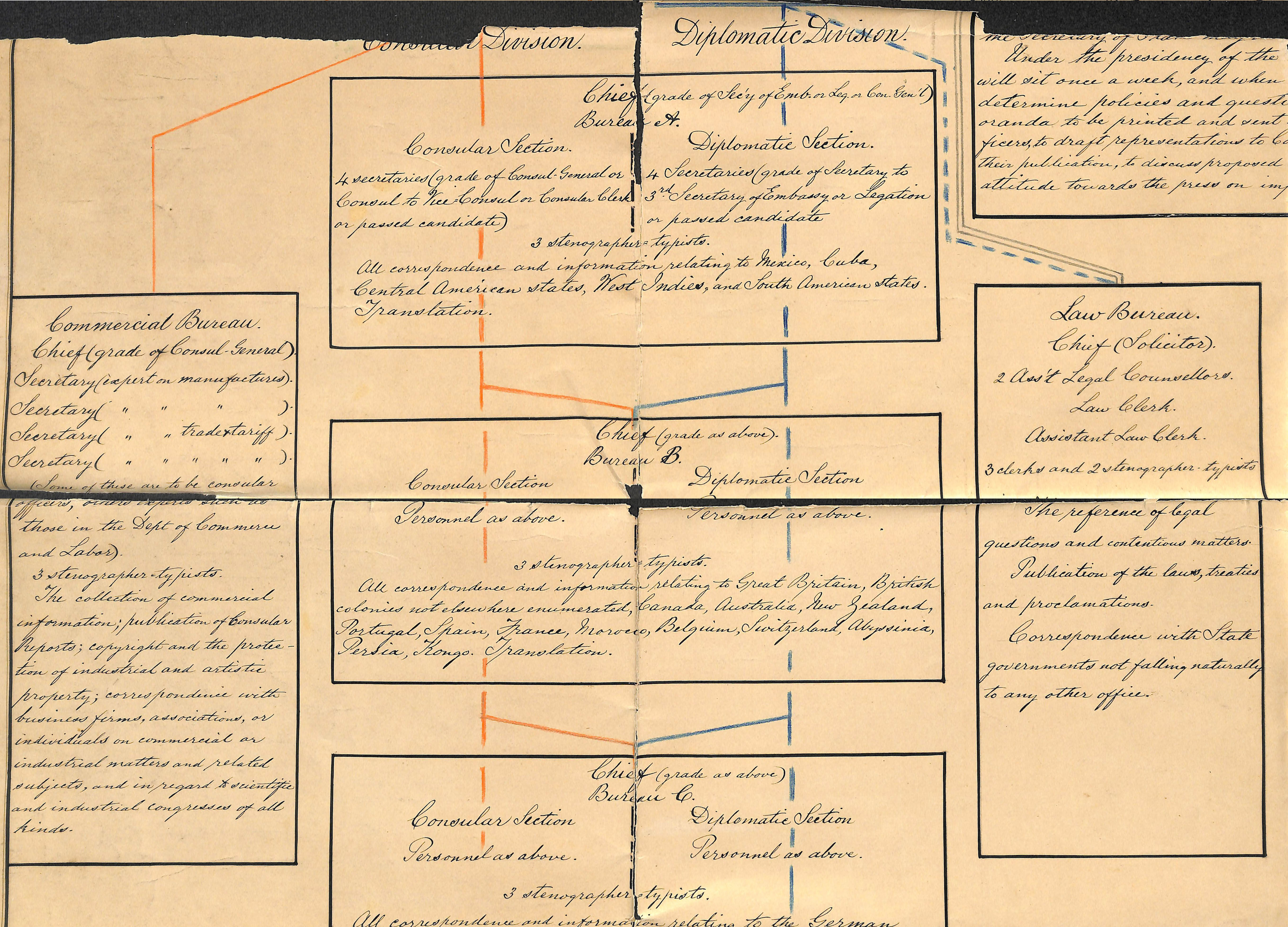
Organization of the State Department
Document Type
Letter
Files
Download Full Text (1.0 MB)
Date
9-21-1910
Keywords
Philander C. Knox, precedence, protocol, Charles D. Norton, Chandler Hale, ceremonies, official receptions, law of hospitality
Description
The document is a carbon copy of a typed letter from Huntington Wilson to the Secretary of State regarding foreign and inter-departmental precedence at official receptions.
Sender
Francis Mairs Huntington-Wilson
Recipient
Philander C. Knox
Corresponds to:
Folder 1-10, Document 32
City
Washington, D.C.
Transcription
September 21, 1910.
Dear Mr. Secretary:
It has not yet been possible to accomplish much toward carrying out your direction that we endeavor this summer to clarify, as far as possible, the matter of precedence in Washington. The Department of State has infinitely more questions of precedence in the course of its own work than any other part of the Government and, although without authority to impose its views on other branches of the Government, it is frequently called upon both by officials of other departments and by private persons to give advice as to relative rank at one or another function. While the White House sometimes decides a question of precedence, it also frequently consults the Department and Mr. Norton has indicated to Mr. Hale a desire that this Department make a more definite list of precedence.
I have turned over to Mr. Hale all our reports on precedence and ceremonial at foreign capitals and have asked him to study them and to get up a tentative plan.
In many capitals there are two or three unsolvable questions and, therefore, in such cases, by common
- 2 -
consent, the officials with irreconcilable claims are never invited together. Such an understanding would be better here in Washington, it seems to me, then the present vague situation.
It seems to me that the best hope of establishing a recognized order of precedence would be this Department's preparing a tentative plan which could be considered by the Executive and by representatives of the Supreme Court, the Senate and the House. It could then be discussed and explained and backed up by the citation of precedent and principle as applied elsewhere, and possibly, the different branches of the Government could agree to be satisfied.
It seems that the "law of hospitality" greatly needs to be explained and understood, - that is the principle upon which the nationality of the hosts and of guests and the official relations between hosts and guests are a most important factor in precedence.
Another thing that has always struck me is the idea that when one category of officials is very large, - like the House of Representatives, - then instead of attempting to give everyone in that category an impossibly high rank, there should rather be given an especially high place to the head of the category as personified
- 3 -
and embodying its dignity.
This principle dove-tails with the idea that the Speaker of the House and the Chief Justice should have in this country a tremendous position as embodying the great dignity of two most important branches of the Government. Possibly if the Chief Justice were so greatly elevated in his representative character the place of associate justices might be reduced a shade as could be the case with Members of the House if the Speaker's tremendous position as representing them were recognized. As to the legislative branch, although the Vice President comes after the President as Vice President nevertheless as President of the Senate he might be considered to represent also the dignity of the higher branch of the legislature and in part that of the whole Congress, in which case there would be added logic in placing the Chief Justice before the Speaker.
Whether the duality of the Department of State has Prime Ministry and Ministry for Foreign Affairs should have any general effect upon inter-departmental precedence might be worth considering, although the primacy of the Secretary of State is already recognized as giving to his whole Department the first place among departments. Like the "law of hospitality" another matter requiring study is the question of locality of the function involving the
- 4 -
principle which would affect the question of precedence of officials when outside of the sphere of their functions vis a vis the local officials within the sphere of their functions, i. e. a cabinet officer and the governor of a state in that state, a cabinet officer and a governor of a state in another state, etc., etc., etc.
To make a thoroughly satisfactory scheme of precedence would be a great task and to be complete would have to deal with all situations and all officials, federal, state and municipal. It might be possible, however, even to do this by starting at the top and placing all corresponding categories horizontally, grade for grade, and indicating wither by separate charts or by a notation of the principles applicable, how the relative grades would be changed on a specific occasion according to the "law of hospitality" or questions of locality and jurisdiction.
I am giving Mr. Hale a copy of these few ideas as of possible suggestive value in the study of this really difficult subject.
Language
English
Rights Statement
Please contact the Myrin Library Special Collections Department for permissions to use this document. https://www.ursinus.edu/library/archives-special-collections/
Recommended Citation
Huntington-Wilson, Francis Mairs, "Letter From Francis Mairs Huntington-Wilson to Philander C. Knox, September 21, 1910" (1910). Organization of the State Department. 10.
https://digitalcommons.ursinus.edu/fmhw_organization/10




Comments
Handwritten comment on a duplicate copy states: "Duplicate of this will be found in 3d Asst. Secy's folder" - Mr. Chandler Hale being the Third Assistant Secretary.